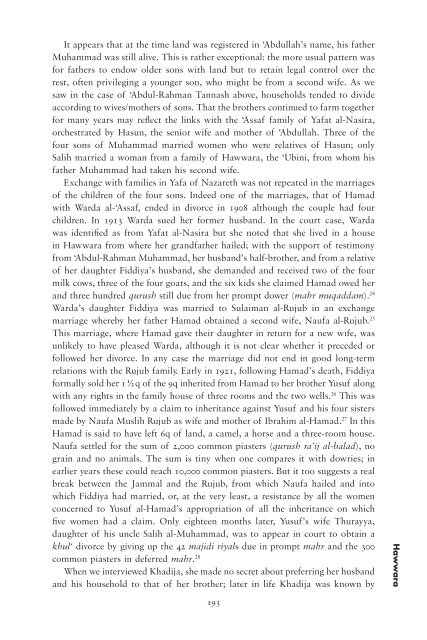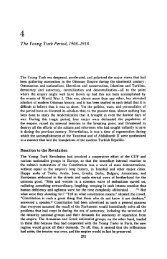Governing property, making the modern state - PSI424
Governing property, making the modern state - PSI424
Governing property, making the modern state - PSI424
Create successful ePaper yourself
Turn your PDF publications into a flip-book with our unique Google optimized e-Paper software.
It appears that at <strong>the</strong> time land was registered in ‘Abdullah’s name, his fa<strong>the</strong>r<br />
Muhammad was still alive. This is ra<strong>the</strong>r exceptional: <strong>the</strong> more usual pattern was<br />
for fa<strong>the</strong>rs to endow older sons with land but to retain legal control over <strong>the</strong><br />
rest, often privileging a younger son, who might be from a second wife. As we<br />
saw in <strong>the</strong> case of ‘Abdul-Rahman Tannash above, households tended to divide<br />
according to wives/mo<strong>the</strong>rs of sons. That <strong>the</strong> bro<strong>the</strong>rs continued to farm toge<strong>the</strong>r<br />
for many years may reflect <strong>the</strong> links with <strong>the</strong> ‘Assaf family of Yafat al-Nasira,<br />
orchestrated by Hasun, <strong>the</strong> senior wife and mo<strong>the</strong>r of ‘Abdullah. Three of <strong>the</strong><br />
four sons of Muhammad married women who were relatives of Hasun; only<br />
Salih married a woman from a family of Hawwara, <strong>the</strong> ‘Ubini, from whom his<br />
fa<strong>the</strong>r Muhammad had taken his second wife.<br />
Exchange with families in Yafa of Nazareth was not repeated in <strong>the</strong> marriages<br />
of <strong>the</strong> children of <strong>the</strong> four sons. Indeed one of <strong>the</strong> marriages, that of Hamad<br />
with Warda al-‘Assaf, ended in divorce in 1908 although <strong>the</strong> couple had four<br />
children. In 1913 Warda sued her former husband. In <strong>the</strong> court case, Warda<br />
was identified as from Yafat al-Nasira but she noted that she lived in a house<br />
in Hawwara from where her grandfa<strong>the</strong>r hailed; with <strong>the</strong> support of testimony<br />
from ‘Abdul-Rahman Muhammad, her husband’s half-bro<strong>the</strong>r, and from a relative<br />
of her daughter Fiddiya’s husband, she demanded and received two of <strong>the</strong> four<br />
milk cows, three of <strong>the</strong> four goats, and <strong>the</strong> six kids she claimed Hamad owed her<br />
and three hundred qurush still due from her prompt dower (mahr muqaddam). 24<br />
Warda’s daughter Fiddiya was married to Sulaiman al-Rujub in an exchange<br />
marriage whereby her fa<strong>the</strong>r Hamad obtained a second wife, Naufa al-Rujub. 25<br />
This marriage, where Hamad gave <strong>the</strong>ir daughter in return for a new wife, was<br />
unlikely to have pleased Warda, although it is not clear whe<strong>the</strong>r it preceded or<br />
followed her divorce. In any case <strong>the</strong> marriage did not end in good long-term<br />
relations with <strong>the</strong> Rujub family. Early in 1921, following Hamad’s death, Fiddiya<br />
formally sold her 1½q of <strong>the</strong> 9q inherited from Hamad to her bro<strong>the</strong>r Yusuf along<br />
with any rights in <strong>the</strong> family house of three rooms and <strong>the</strong> two wells. 26 This was<br />
followed immediately by a claim to inheritance against Yusuf and his four sisters<br />
made by Naufa Muslih Rujub as wife and mo<strong>the</strong>r of Ibrahim al-Hamad. 27 In this<br />
Hamad is said to have left 6q of land, a camel, a horse and a three-room house.<br />
Naufa settled for <strong>the</strong> sum of 2,000 common piasters (qurush ra’ij al-balad), no<br />
grain and no animals. The sum is tiny when one compares it with dowries; in<br />
earlier years <strong>the</strong>se could reach 10,000 common piasters. But it too suggests a real<br />
break between <strong>the</strong> Jammal and <strong>the</strong> Rujub, from which Naufa hailed and into<br />
which Fiddiya had married, or, at <strong>the</strong> very least, a resistance by all <strong>the</strong> women<br />
concerned to Yusuf al-Hamad’s appropriation of all <strong>the</strong> inheritance on which<br />
five women had a claim. Only eighteen months later, Yusuf’s wife Thurayya,<br />
daughter of his uncle Salih al-Muhammad, was to appear in court to obtain a<br />
khul‘ divorce by giving up <strong>the</strong> 42 majidi riyals due in prompt mahr and <strong>the</strong> 300<br />
common piasters in deferred mahr. 28<br />
When we interviewed Khadija, she made no secret about preferring her husband<br />
and his household to that of her bro<strong>the</strong>r; later in life Khadija was known by<br />
193<br />
Hawwara












